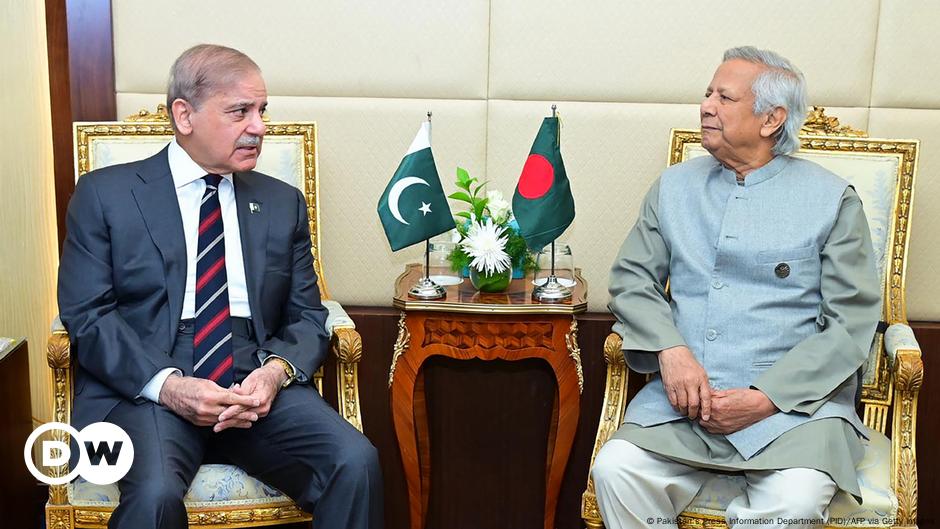Since the appointment of Muhammad Yunus as interim leader of Bangladesh following the ouster of Sheikh Hasina’s government following a student-led movement in August, Dhaka and Islamabad appear to be on the path to rapprochement.
Pakistani Prime Minister Shehbaz Sharif and Yunus agreed to deepen bilateral cooperation in all areas of mutual interest after the two leaders met on the sidelines of a conference in Cairo in December.
Maritime contacts and military relations
The establishment of direct maritime contacts, strained since the 1971 War of Independence, when Bangladeshi nationalists seceded from West Pakistan, has marked a historic low in relations.
The interim government of Bangladesh also lifted previous restrictions that had mandated physical inspection of cargo from Pakistan.
Pakistan will start training Bangladesh Army in February 2025, strengthening military ties between the two countries. Bangladesh will also join Pakistan in the joint naval exercise “Aman 2025” at Karachi port.
As Pakistan strengthens ties with Bangladesh amid concerns about potential security threats in the region, India is closely monitoring developments that have the potential to reshape power dynamics in South Asia.
Strategic implications for India
Dhaka’s relations with New Delhi have deteriorated since the ouster of Hasina, who was backed by India and now lives in exile there.
Foreign policy experts and diplomats highlight that India has to deal with a complex geopolitical environment marked by instability and security threats in its northeastern states.
While New Delhi is closely monitoring these developments, it is also increasing security along its border with Bangladesh.
“There is no doubt that relations between Bangladesh and Pakistan have improved overall. This change has security implications for India’s northeastern states,” Shanti Marriott D’Souza, founder of the Mantraya Institute of Strategic Studies, told DW. “
New Delhi has long been concerned about human trafficking, infiltration and militant insurgency along the border, especially as Bangladesh shares borders with the Indian states of West Bengal, Assam, Meghalaya, Tripura and Mizoram, where there is a risk of violent outbreaks.
“The important questions to consider are whether these strengthening ties are simply a response to India’s strategic pressure, or if they are part of a larger design to destabilize India. If we assume the latter is true, then Can the current regime in Dhaka afford to pursue such a policy, D’Souza said? The answer is no.”
Pakistan’s increasing influence in Bangladesh
According to D’Souza, it is unclear whether Yunus’s policies will be in line with Bangladesh’s bureaucracy, for whom the interim government is a stop-gap arrangement.
“New Delhi needs to keep its eyes and ears on the ground to formulate strategies to deal with the rapidly changing internal and external dynamics in the region,” he said.
India’s long-term relationship with its neighbors, especially Bangladesh, is focused on promoting prosperity rather than addressing India’s security concerns, Ajay Bisaria, India’s former high commissioner to Pakistan, told DW.
“This understanding is being challenged by the new regime in Dhaka,” Bisara said, adding that Pakistan’s efforts to rebuild security ties with Bangladesh and counter Indian influence could destabilize the regional security balance.
Bisara said, “While India will closely monitor these emerging dynamics, it may also need to contain Pakistan’s growing influence in the eastern periphery through proactive military postures and security measures.”
Arms transfer raises concerns
In particular, the new alliance between Pakistan and Bangladesh poses a significant threat to India’s strategic interests, especially to the Siliguri corridor, often known as the Chicken’s Neck.
The geopolitically sensitive route connects the northeastern Indian states to the rest of India through a narrow strip of Indian territory of 20–22 kilometers (12–14 mi) at its narrowest.
India fears that China may aim to establish its presence along the corridor under the guise of development work with Bangladesh.
Meanwhile, India has stepped up security on its border with Bangladesh, deploying technological solutions to address vulnerabilities and curb infiltration and smuggling in unfenced border areas and conducting high-level border security force inspections.
“India will have security concerns over the transfer of arms and explosives to Bangladesh for use by Islamic terrorists freed by the Yunus-led interim government,” former Bangladesh High Commissioner Pinak Ranjan Chakraborty told DW.
Chakraborty claimed that the transfer of these weapons to rebel groups in India could create significant security problems.
However, Sriradha Dutta, a Bangladesh expert at the Jindal School of International Affairs, told DW that although India-Bangladesh relations are going through a difficult phase at the moment, relations will calm down once an elected government is installed in Bangladesh.
“Although Bangladesh and Pakistan are showing signs of engagement, it is India that holds a more important position for Bangladesh,” Dutta said.
Dutta concluded, “Both sides need to get over the current rhetoric and get down to business. Once bilateral engagement resumes, Indian security concerns will certainly be taken into consideration and that will happen only if the neighbors engage.” Would like to be and would not like to raise unnecessary issues.” ,
Edited by: Keith Walker






Leave a Reply